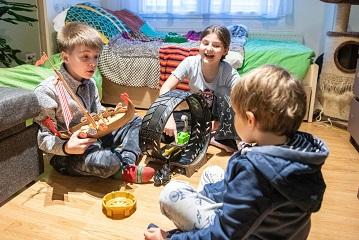This information is also available in: Ukrainian | українська | Russian | русский
Missing Children hotlines
The European harmonised number for Missing Children hotline (116 000) is available in all 27 EU Member States, Albania, Serbia, Switzerland and the UK. Anyone can call 116 000 to report a missing child. The Missing Children hotlines work closely with local law enforcement and provide legal, psychological, and practical support to children and parents who are looking for each other.
Missing Children Europe also offers information on how to report missing Ukrainian children across Europe, on publicity appeals on Ukrainian children currently reported missing across borders in the EU and on resources to support missing children and their families fleeing.
Child helplines
Child helplines provide psychosocial support and information to children, and to adults calling on behalf of children.
The European harmonised number for Child Helplines (116 111) is operational in 24 EU countries, in addition to several non-EU countries, including Ukraine.
The rights of children arriving from Ukraine

All children from Ukraine arriving in the EU should have swift access to their rights, without discrimination, including the necessary psychological support, healthcare and access to education. Particular attention must be given to unaccompanied children. It is important that they are immediately registered upon arrival; they should receive full and safe support and a representative of child protection services should be present as quickly as possible. Family tracing must be a priority.
All children (i.e. persons under the age of 18) fleeing from the war in Ukraine are entitled to protection in the EU. They have the right to:
- have their identity registered upon entry to the EU – and, where children do not travel accompanied by parents or other adults responsible for them, border guards will also register the identity of the known adults accompanying them in their travel or waiting for them, as well as the declared EU country of destination
- be given access to care (including housing) as soon as possible, healthcare (including psychological support), and education
- be heard and express their views about any decision about to be taken concerning them (where age and degree of maturity allow for this)
In the case of unaccompanied or separated children, they also have the right to be appointed a guardian as soon as possible, who will provide the parental authority figure for them until they can be reunited with their parents or other family members. The guardian may be one of the known adults with whom the child has travelled, if the authorities establish that this conforms with the best interests of the child. Sometimes the guardian may be different from the adults who will provide care for the children, e.g. in foster families, reception centres, etc. The children have the right to ask not to be separated from the known adults who are capable of taking responsibility for their care.
The Commission is:
- supporting and funding access to psychosocial care and basic services
- supporting the appropriate reception and care for orphans and children with disabilities
- encouraging the implementation of the European Strategy on the Rights of the Child. National coordinators of the European Child Guarantee will play an important role at national level and in sharing best practices at EU level
- working with international organisations to reunite families through family tracing programmes
- supporting Member States, through the renewed Schengen Information System, in their work tackling child trafficking and abduction
- preparing standard operating procedures for transfers of unaccompanied minors and other children with special needs to ensure protection from risks of abuse and trafficking
